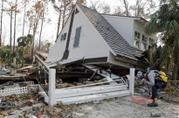
NEW ORLEANS - To cries of "Thank you, Jesus!" and catcalls of "What took you so long?," a National Guard convoy packed with food, water and medicine rolled through axle-deep floodwaters Friday into what remained of New Orleans and descended into a maelstrom of fires and floating corpses.
"Lord, I thank you for getting us out of here!" Leschia Radford shrieked amid a throng of tens of thousands of storm victims outside the New Orleans Convention Center.
More than four days after the storm hit, the caravan of at least three-dozen camouflage-green troop vehicles and supply trucks arrived along with dozens of air-conditioned buses to take refugees out of the city.
President Bush also took an aerial tour of the ruined city, and answered complaints about a sluggish government response by saying, "We're going to make it right."
"They should have been here days ago," said 46-year-old Michael Levy, whose words were echoed by those around him yelling, "Hell, yeah!"
"We've been sleeping on the ... ground like rats," Levy added. "I say burn this whole ... city down."
The soldiers' arrival-in-force came amid angry complaints from the mayor and others that the federal government had bungled the relief effort and let people die in the streets for lack of food, water or medicine.
"The people of our city are holding on by a thread," Mayor Ray Nagin warned in a statement to CNN. "Time has run out. Can we survive another night? And who can we depend on? Only God knows."
By nightfall Friday, the mayor's tone had changed. Nagin returned from a meeting with President Bush a picture of calm.
"I feel much better. I feel like we've gotten everyone's attention, and hopefully they'll continue to do what they're doing," he said Friday, leaning against a railing in lobby of a hotel that houses his temporary lodgings and command post.
A day earlier, the mayor erupted in tears during a radio interview and told the government to "get off your asses and let's do something."
The president took a land and air tour of hard-hit areas of Louisiana, Mississippi and Alabama, and admitted of the relief effort: "The results are not enough." Congress passed a $10.5 billion disaster aid package, and Bush quickly signed the measure.
The explosion at a warehouse along the Mississippi River about 15 blocks from the French Quarter jostled storm refugees awake and sent a pillar of acrid gray smoke over a city that the mayor has said could be awash with thousands of corpses. Other large fires fire erupted downtown.
With a cigar-chomping general in the convoy's lead vehicle, the trucks rolled through muddy water to reach the convention center. Flatbed trucks carried huge crates, pallets and bags of relief supplies, including Meals Ready to Eat. Soldiers in fatigues sat in the backs of open-top trucks, their rifles pointing skyward.
Diane Sylvester, 49, was the first person through the line, and she emerged with two bottles of water and a pork rib meal. "Something is better than nothing," she said as she mopped sweat from her brow. "I feel great to see the military here. I know I'm saved."
Angela Jones, 24, began guzzling her water before she even cleared the line.
"Like steak and potatoes!" she said of the cool water. "I didn't think I was going to make it through that."
A rag shielding her from the searing heat and a cart holding her only belongings, 70-year-old Nellie Washington asked: "What took you so long? I'm extremely happy, but I cannot let it be at that. They did not take the lead to do this. They had to be pushed to do it."
With Houston's Astrodome already full with 15,000 storm refugees, that city opened two more giant centers to accommodate an additional 10,000. Dallas and San Antonio also had agreed to take refugees.
One group of Katrina's victims lurched from one tragedy to another: A bus carrying evacuees from the Superdome overturned on a Louisiana highway, killing at least one person and injuring many others.
At the broken levee along Lake Pontchartrain that swamped nearly 80 percent of New Orleans, helicopters dropped 3,000-pound sandbags into the breach and pilings were being pounded into place to seal off the waters. Engineers also were developing a plan to create new breaches in the levees so that a combination of gravity and pumping and would drain the water out of the city, a process that could take weeks.
Law and order all but broke down in New Orleans over the past few days. Storm refugees reported being raped, shot and robbed, gangs of teenagers hijacked boats meant to rescue them, and frustrated hurricane victims menaced outmanned law officers. Police Chief Eddie Compass admitted even his own officers had taken food and water from stores. Officers were walking off the job by the dozens.
Some of New Orleans' hospitals, facing dwindling supplies of food, water and medicine, resumed evacuations Friday. Rescuers finally made it into Charity Hospital, the city's largest public hospital, where gunfire had earlier thwarted efforts to evacuate more than 250 patients.
Behind, they left a flooded morgue where residents had been dropping off bodies. After it reached its capacity of 12, five more corpses were stacked in a stairwell. Other bodies were elsewhere in the hospital.
Administrator Don Smithburg said his numbed staff was forced to subsist on intravenous sugar solutions.
"Some of them are on the brink of unable to cope any longer," he said.



No comments:
Post a Comment